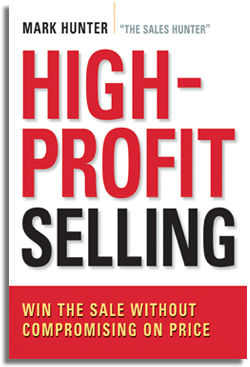I don't know about you, but I've always been squeamish when prospects ask me about pricing. My stomach churns as I hope against hope that it will be a non-issue. It never is.
That's why I asked Mark Hunter, author of High Profit Selling, if he'd answer a few of questions. His new book is filled with numerous strategies to help salespeople deal with all sorts of pricing issues. (Note: Click here to get a free download of Chapter 1: http://thesaleshunter.com/high-profit-selling)
 Today's customers are busy people. They want you to net it out: "What do sell? How much is it?" How do you get them to quickly see that price is not everything?
Today's customers are busy people. They want you to net it out: "What do sell? How much is it?" How do you get them to quickly see that price is not everything?
Mark Hunter: The key is to get them talking quickly about their primary need – which means you have to ask them a compelling question. However, you can't always be sure if what they’re telling you is real or merely a diversion tactic.
So don't focus so much on what they tell you initially. Instead, take what they share and ask them follow-up questions that explore their need in more depth. It’s their follow-up response that contains the real benefit you can zero in on. This, in turn, will keep them from focusing only on price.
You talk about how important it is for the salesperson to be confident in their price. What should you do if you don't have that confidence – or even believe your prices are too high?
Mark Hunter: Get out of the business! If you don’t believe that what you're selling is worth it, then how can you expect your customer to believe you?
Seriously though, if you are struggling with this issue, start by asking your best customers what it is they like about you and what you sell. Record their answers on a piece of paper and re-read the reasons each time you’re about to talk with another customer. It might sound goofy, but it works.
You devote an entire chapter in your book to skipping the sales presentation. Why do you suggest this? And how does it relate to high-profit selling?
Mark Hunter: Sales presentations are yesterday’s sales model. The internet allows customers to find out anything they want to know about what you’re selling. The busy customer wants to know how they will benefit and the way you show them this is by having a conversation with them.
It’s pretty hard to really engage a customer in conversation when you’re busy pushing your way through a boring PowerPoint presentation that neither you nor the customer really wants to be viewing.
Engage the customer. The more you engage them in a conversation, the more they will see your competence in what you’re selling.
Let's talk about price increases. Every seller I know dreads talking to their customers about them. What do you suggest we do?
Mark Hunter: First thing is you don’t ask your customer if you can increase their prices. You tell them you’re raising their prices. Does it make a difference? Yes! The reason is it’s your level of confidence and how you come across to the customer.
Now, before you get to this point, you must develop your price increase strategy. By doing this homework, you’re able to be confident. I firmly believe more profit is lost because the salesperson doesn’t believe in the price increase than is lost by the customer refusing to accept it.
In my book I talk about 10 steps for dealing with price increases. But the one that I personally think is most important is write out a list of what you’ve done for the customer since the last increase and the value they've received. This gives you some strong talking points that will help you address any customer objections.
What should sellers do if they've tried everything they can to avoid discounting the price and they still can't get the order?
Mark Hunter: Be prepared to walk away. Once you start caving in on price to close a sale, you never stop. Sellers fail to realize how quickly the profit margin of what it is they’re selling gets cut when they start offering discounts. Keep in mind the customer who fights you on price will most likely fight you on everything else. The high-discount customer tends to become the high-maintenance customer.
Lots of salespeople are selling "commodities." What suggestions to you have for them?
Mark Hunter: There are always points of difference that can be leveraged. I have the privilege of working with a number of companies that sell in this type of environment. What I emphasize to them is that they must find those issues or concerns the customer has that can be used to separate one commodity offering from another.
Remember two things: Customers are buying confidence and they’re also buying a timeline. A person could be offering a lower price, but if the customer doesn’t have confidence in it, the price is worthless. Always remember, they're not buying a commodity, they’re buying an outcome.
Thanks so much for your insights, Mark. They're very helpful. And, if people want to learn more, what do you suggest?
Mark Hunter: Jill, your website has incredible insights and I would encourage everyone reading this to make sure they read everything you write. Additionally, I’d encourage them to check out my book, High-Profit Selling: Win The Sale Without Compromising on Price and visit my website, www.TheSalesHunter.com I try to regularly put on the website specific tips to help salespeople sell without having to discount their price.
FINAL Note: Check out Mark's website and his book – they're both excellent!